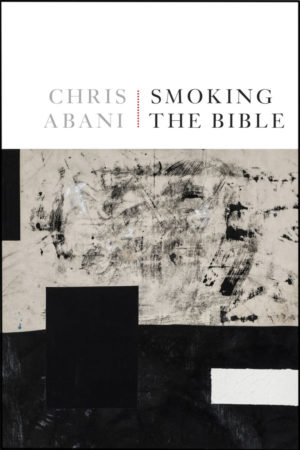Smoking the Bible
by Chris Abani
reviewed by Rhony Bhopla
Chris Abani’s autobiographical book of poems, Smoking the Bible, centers on the relationship of two brothers growing up in Nigeria with an Igbo father and an English mother. The poems, which incorporate the Igbo language along with references to West African rituals, reveals the devotion of a sibling who has become his brother’s keeper as he succumbs to cancer. Displacement, violence at home, civil unrest, and neocolonial forms of subjugation are all running themes in this accomplished, elegiac collection.
The poems of Smoking the Bible are portraits of suffering, and Abani delivers a deft sense of vulnerability in his depictions of Nigerian life. In the poem “Incantation,” the poet’s ancestral tongue renders other languages futile:
What words can you wrap around
a dying brother, still dying, even now.
A man who has not eaten for a month
sips at water and says, Even thirst is a gift.
He asks what other gifts God has given him.
I’m your gift, his daughter says from a corner.
And he smiles and rasps⏤
You can only unwrap a child once.
The rest is prayer and even more prayer.
You sing softly to him in a language
only the two of you speak and he
snores softly into your palm, breath and blood.
To make sense of suffering, the collection suggests, is impossible and perhaps beside the point. What might be gleaned from our attempts at grappling with the unfathomable, then? The answer is found in the lines of “Sojourn,” in which the pain of losing a loved one is equaled only by the speaker’s belief that death is not final.
You turn from the image, say: Death will find you
how it wills, and as it wills. The chemo in you isfire too. And in the end,
in someone’s heart, we too must burn.
While there are many tender moments throughout the collection, Abani is particularly attuned to the humanity of those living in the diaspora. His poetry redresses what Nobel Laureate Wole Soyinka calls the “fictioning of Africa.” The poem “Flay,” for example, is an English sonnet broken out into couplets. With this gesture, Abani abandons the traditional form. Halfway through the restlessly inventive sonnet, “Flay” becomes a poem of address:
Migrant,
punished by spice and the scent of cooking,you wake up on a cold day in another country
and put your faith in hot rice and braised goat,and the persistent aftertaste of a lost home.
In “Fragrance,” Abani is alert to the tonalities of the Igbo language. “But he uses the Igbo, egara, a word that / opens and closes like a fish’s gills, / life and death pulling and pushing.” And the speaker in another poem, “White Egret,” locates meaning in traditional Igbo practices. The image of the titular bird derives from a verse in the Yoruba ritual of Ifa divination:
All my life, men with blackened insides
have fought to keep
the flutter of a white egret in my chest
from bursting into flight, into glory.
In common with Igbo oral traditions, Smoking the Bible is infused with figures of speech such as internal rhyme, assonance, and repetition. Take the opening lines of “Olokun”: “Into the inky smoke of lake mist, Evanston’s / lighthouse throws a weak fire, more gleam than flame, / but sufficient light for ghosts / to winter by, and so I stand on the empty beach.” The resonance of gleam and flame builds lyric momentum, and the delightful consonance of the inky smoke of lake offers a vivid picture of the speaker’s unfamiliar surroundings in the suburbs of Chicago.
Chris Abani joins a list of authors like Victoria Chang, Prageeta Sharma, Rachel Eliza Griffiths, Forrest Gander, and Saddiq Dzukogi who have molded personal grief into poetry. Perhaps rather loosely classified as “elegy,” theirs is a poetry of transformation that grapples with the idea of mortality and makes art out of memory. Smoking the Bible stands out with its emphasis on the importance of ancestral language and ritual practices, reminding readers that the joy of reading poetry is first and foremost the experience of language. Chris Abani takes us on a journey to an unknown destination, proving that solace is attainable even in the midst of personal tragedy.
Published on October 4, 2022

